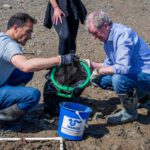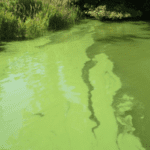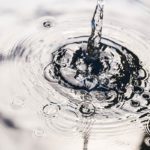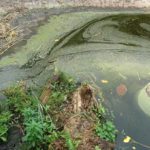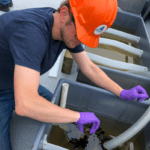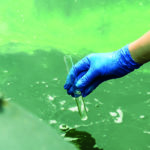Against the grain: What can be done about microplastics in soils and digestate?
Microplastics are everywhere: We know that much. But should we be worried? What can we do about it? Some of the speakers at Aqua Enviro's European Biosolids and Bioresources Conference, in late November, presented findings from a project aiming to understand the levels of this contaminant in compost and AD digestate. A change in the policy landscape seems imminent, as Envirotec found out.
Sponsored Content: Trials show new PFAS adsorbent outperforms current methods
Trials have been undertaken by two independent institutions, using a next generation PFAS adsorbent media developed by Puraffinity, the London based science materials company.
Dangers and opportunities of digital transformation explored at British Water Data Conference
The sixth British Water Data Conference, which took place on 3 November 2022, kicked off with a warning from keynote speaker Oliver Grieveson on...
Ocean appointment: Fukushima water discharge facilities under construction
A coastal facility will dilute and release wastewater from the former nuclear plant at Fukushima Daiichi, beginning in Spring 2023. Not all dangerous isotopes will be removed, notably Tritium.
Call for Thames Water to make swift upgrades to Cassington sewage works after Wolvercote...
Oxford-based Wolvercote Mill Stream - the only official swimming spot on the Thames – has failed bacteria safety tests. Environmental charity Thames21 has warned...
Complaint launched after government misses legal deadline on environmental protections
On 1 November green groups submitted a letter of complaint to Defra after the Government failed to meet a legal deadline on setting new...
Microplastics: Six surprising everyday things that contain and release them
Microplastics have become so widespread that they have been discovered in fresh Antarctic snow. They enter the environment in all kinds of ways, not...
New measures and research needed to tackle ecological impact of pharmaceuticals
A group of international researchers has issued a warning about the increase in pharmaceutical contamination in the environment, with suggestions about how it might...
Fracking vs local democracy: The struggle continues
The government’s lifting of the moratorium on fracking on 22 September was accompanied by assurances that it would only take place where there was...
Call for government to make swift decision on ban on plastic in wet wipes
The government needs to make an immediate decision on banning plastic in wet wipes in order to help tackle this sewage-based pollution ending up...
As winters warm, nutrient pollution threatens 40% of US
A first-of-its-kind national study appears to find that previously frozen winter nutrient pollution — unlocked by rising winter temperatures and rainfall — is putting...
Washing machine filter captures microplastic without the need for disposables
Bristol based microplastic technology company Matter is launching Gulp, "the first sustainable, long-lasting washing machine microfibre filter" on Kickstarter from 11 October.
The firm develops...
Defra’s Storm Overflows Discharge Reduction Plan falls short, says conservation group
"We are appalled to see that Defra’s Storm Overflows Discharge Reduction Plan has not taken into account the thousands of responses to the draft...
Rainwater is no longer drinkable thanks to PFAS, say researchers
A perspective article by researchers from Stockholm University and ETH Zurich, published in August in Environmental Science & Technology, suggests that environmental contamination by...
Study aims to better understand nitrogen pollution sources and solutions
Study traces the source of nitrogen pollution affecting the world’s second largest barrier reef
Agricultural operations are responsible for the vast majority of nitrogen...
Research seems to confirm the effectiveness of oil dispersants
One of the few tools available to mitigate the damage from marine oil spills are chemical dispersants that break down oil in the water....
New Antarctic study shows levels of ‘forever chemicals’ reaching the remote continent have been...
New evidence from Antarctica shows that toxic ‘fluorinated forever chemicals’ have increased markedly in the remote environment in recent decades and scientists believe CFC-replacements...
Microbes degrade toughest PFAS
Under anaerobic conditions, common microbial communities can break the ultra-strong carbon-fluorine bond characteristic of these compounds.
Tool to help understand the environmental effects of human medicines in Scotland
A new data visualisation tool aims to help researchers better understand the effects medicines have on Scotland’s environment. It has been launched by the...
Microbes can degrade the toughest PFAS, says new study
Under anaerobic conditions, common microbial communities can break the ultra-strong carbon-fluorine bond
Engineers at the University of California (Riverside) are the first to report...












